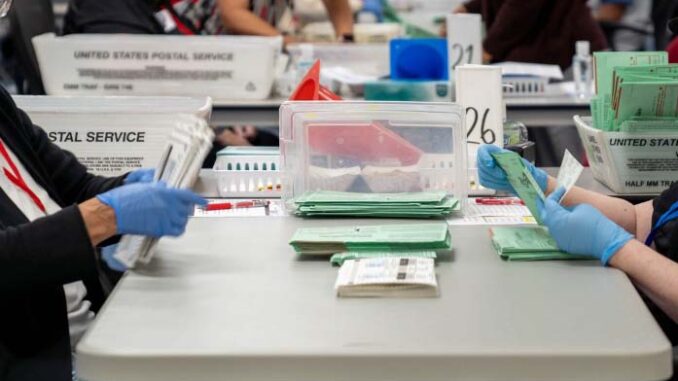
In 2022, Congress changed the electoral count act, moving up the deadline by which one of the final steps in the election process must be completed – the transmission of the certificate of ascertainment of who won a state’s presidential electors to Congress.
Early that year, then-Senator Ugenti-Rita introduced a bill to expand the threshold to trigger a 100% machine recount to from one tenth of one percent to half a percent, a bill that would have applied to the 2020 presidential election had it then been the law.
Though legal experts say that it is questionable whether Congress itself is bound to follow the electoral count act since its power to accept and reject presidential electors comes from the U.S. Constitution, the confluence of these two bills, one state, one federal, opened up the very real possibility that, in the 2024 presidential election, the recount will not be completed by the federal deadline.
🚨This is what actual election interference looks like!
Too scared to run for reelection @billgatesaz, continues to coordinate with the media to push more @MaricopaCounty election propaganda. There are plenty of non-legislative solutions that can address potential timeline… https://t.co/bX1G3M29zh
— Michelle Ugenti-Rita (MUR) (@MichelleUgenti) February 4, 2024
Rather than raising this issue with members of the Arizona Legislature’s House and Senate elections committees last year, the Counties waited until after the 2023 legislative session was concluded to begin sounding alarm bells about the crisis. Even then, neither the 9th floor nor the counties would consider the simple fix allowed by the electoral count act itself – transmission of the certificate of ascertainment itself by the federal deadline with a follow-up later on in the unlikely event that the results of the machine recount revealed that the first machine count had been in error. Instead the counties proposed shortening numerous election-related deadlines in order to allow a potential recount to be completed earlier. This worried several election-watchers, who speculated that if a simple printer change was enough to cause chaos in Maricopa County’s 2022 general election, a change to numerous election dates would be far beyond the capabilities of local elections officials.
Nevertheless, for months, the Legislature worked together with the counties on this, more complicated, fix and, sources say, by last Friday, a deal had been struck in which a variety of election dates would be reworked in order to shorten the election timeline. This deal also included, as a concession to conservatives, a signature election integrity priority of the Republican Majority – the codification, for the first time, of legally-binding signature verification rules into Arizona law to ensure that the process being made more rushed would not result in hasty review of signatures on ballot affidavit envelopes. As noted by the court in the Kari Lake trial, no legally binding rules for how signature verification must be performed currently exist in Arizona law.
But over the weekend the deal appears to have run off the rails, with the Governor’s office and Counties taking to social media and the press to call for the passage of either a “clean” election reform bill or the inclusion of liberal policy priorities which would cancel out the benefits of signature verification such as electronic curing. The Senate is reportedly now considering whether to accede to the Governor’s request that the signature verification rules, modeled on those Governor Hobbs herself wrote as Secretary of State, be removed from the bill and move forward with the rest of the county’s proposal, perhaps with a smaller, less meaningful concessions.
